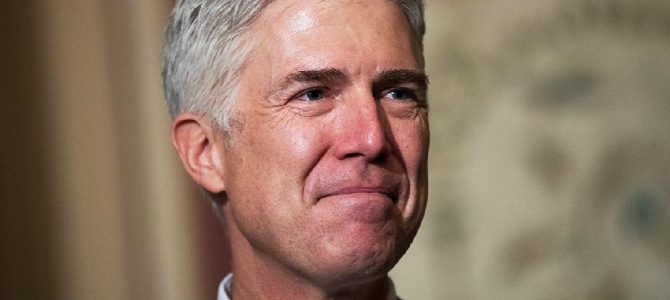To “Bork” someone is to obstruct through systematic defamation or vilification. The practice slightly pre-dates the obstruction of Robert Bork’s nomination to the Supreme Court in 1987, but he was its earliest and most prominent victim. The campaign against Bork was run by leftist activists and Democratic senators and included publishing his video rental records and scurrilous allegations of reprehensible views, lack of evidence notwithstanding. It worked, to the shame of those involved in the efforts.
The practice completely changed the judicial nomination process, and its continued use is one of the reasons why Judge Neil Gorsuch is such a formidable nominee. The Borking groups have been working overtime for months to dig up dirt on the Colorado judge and have come up completely empty. They were reduced to running a story in the New York Times last week alleging that Gorsuch served a wealthy client well. The New York Times’ spin was evident in the headline choice — “Neil Gorsuch Has Web of Ties to Secretive Billionaire” — but the story didn’t raise any alarms at all.
The last ditch Bork attempt is a letter from one of Gorsuch’s law students. The student alleges that in an ethics class, Gorsuch discussed ethics. I’m sure this will be devastating. Of course, the headline from NPR tells you how such stories get spun for maximum impact — “Former Law Student: Gorsuch Told Class Women ‘Manipulate’ Maternal Leave.” The piece is authored by Arnie Seipel and Nina Totenberg, the latter’s liberal bias being pronounced since her 1995 suggestion that justice would be served if Jesse Helms and his grandchildren contracted AIDS.
Multiple students report that Gorsuch discussed the topic of parental leave in the ethics class in which students were to think ethically about their professional behavior, but they differ on whether those discussions were problematic. Student Jennifer Sisk, a former Obama political appointee and aide to Sen. Mark Udall (D-CO), says:
Law professors often ask provocative questions in the course of teaching. When asked if that’s what Gorsuch may have been doing, Sisk told NPR, “It wasn’t what he was doing. This was second-to-last class, hadn’t been the style he had been using to sort of raise issues all class, or all semester.”
She added, “He kept bringing it back to that this was women taking advantage of their companies, that this was a woman’s issue, a woman’s problem with having children and disadvantaging their companies by doing that.”
Sisk complained at the time to a dean and says of her motivation, “I did think he was a good professor. But my interest is more with having someone talk to him and explain to him why he shouldn’t be making these comments in class, why he needed to understand what the state of employment law was, and why it was problematic for him to express this view of employment law to a class full of students.” She made a comment on Facebook when Gorsuch was nominated by Trump and liberal activists took it from there. Again, there are slim pickings for a borking, so they have to take what they can.
In any case, Will Hauptman, of Boulder, Colorado, upon learning of this campaign, says the class discussion was different than claimed:
Although Judge Gorsuch did discuss some of the topics mentioned in the letter, he did not do so in the manner described. The judge frequently asked us to consider the various challenges we would face as new attorneys. Among those challenges were balancing our desire to perform public service with our need to pay off student loan debt, and the tension between building a career in a time-intensive profession and starting a family and raising children—especially for women. The judge was very matter-of-fact in that we would face difficult decisions; he himself recalled working late nights when he had a young child with whom he wished to share more time. The seriousness with which the judge asked us to consider these realities reflected his desire to make us aware of them, not any animus against a career or group. And despite the soberness that these topics sometimes imparted on the class, our conversations were always respectful and cordial.
Judge Gorsuch was known for high scores from law students during end-of-class evaluations. He had a median score of 6.0 — the highest possible score — for “instructor respect and professional treatment.” He was known for using the Socratic method — in which hypotheticals are vigorously engaged — as he did in the discussion of the ethics of parental leave. Students rated him favorably for this method and his general classroom approach.
Former ethics student Catherine Holtgrewe said of the nominee for the Supreme Court that “Judge Gorsuch was an exemplary professor and treated every student with absolute respect. He took an active interest in our educational and professional success. Judge Gorsuch always made time in his busy schedule to further discuss class materials and offer professional advice and support. I have never heard Judge Gorsuch ever speak disrespectfully to or about anyone. As a former student, I am a witness to the respect that he showed towards his female students and fellow professors at Colorado Law.”







